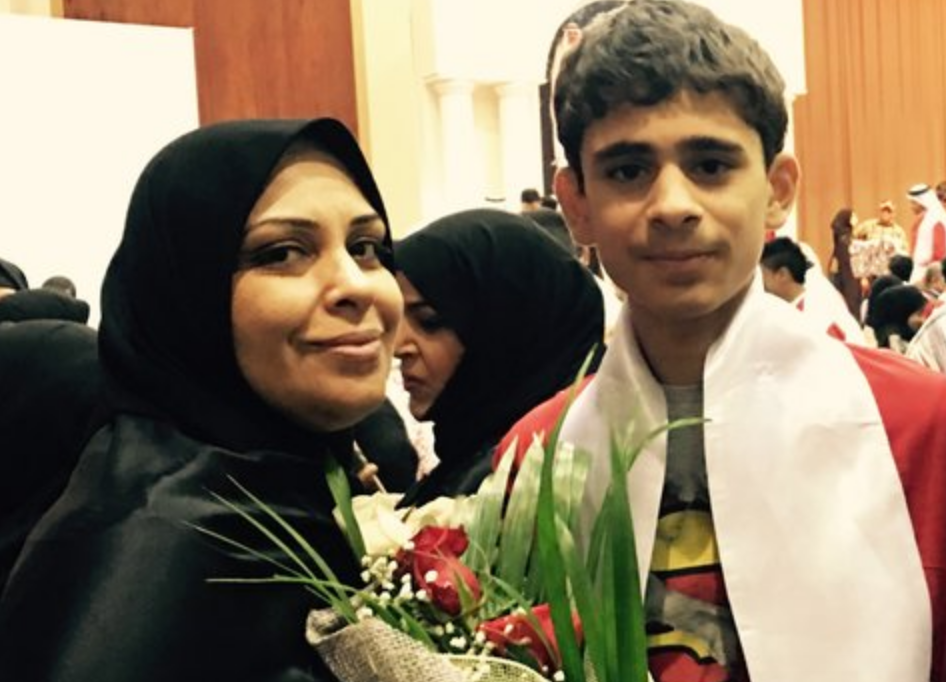27 October 2017 – Five political detainees in Bahrain’s Isa Town Women’s Prison entered the fourth day of a hunger strike today in protest of glass barriers in the visitation centre and their harsh and ill-treatment by the prison officials. Four detainees required medical attention yesterday, on the third day of their strike. The Bahrain Institute for Rights and Democracy (BIRD) condemns the continued ill-treatment of the detainees in Isa Town Women’s Prison.
Detainees and their family members who spoke to BIRD state that Hajar Mansoor Hassan, the 49-year-old mother-in-law of BIRD Director of Advocacy Sayed Ahmed Alwadaei, was transferred at dawn to the Qalaa Hospital, where she was put on a saline drip. The authorities returned her to prison at 4.15pm. Hajar Mansoor Hassan is at risk of being sentenced on trumped up charges, in a reprisal against her son-in-law.
Three other detainees, Najah Al Sheikh, Amira Al-Qashami, and Medina Ali, needed medical treatment following a dramatic fall in their blood sugar levels and blood pressure after three days on hunger strike. They were taken to the prison clinic and given saline. The authorities have repeatedly urged the women to end their hunger strike, but they plan to continue until their demands are met. A fifth detainee, Zainab Marhoon, is also on hunger strike.
The women are demanding an end to their humiliating and ill-treatment by prison staff, and the removal of a barrier in the visitation centre. Inmates previously declared a strike against all family visits on 3 October, after the authorities installed a glass barrier preventing inmates from embracing family members on visit. The women are also demanding greater privacy during phone calls.
Hajar has said she will continue the hunger strike until the prison authorities’ treatment of detainees improves, saying she would continue “until they consider us humans and not animals.”
Head of the prison administration Major Al-Barduli has previously insisted that prison officers receives training on human rights. Yet the authorities’ claims are challenged by the continued hunger strike, and reports of ill-treatment in Isa Town Women’s Prison. The problems in the prison’s administration, including increasing ill-treatment of detainees, appear to have grown since July, when human rights defender Ebtisam Al-Sayegh was arrested by the NSA and held there. Al-Sayegh was granted temporary release on 22 October.
On 24 October, Hajar was barred from making phone calls. When Hajar took her concerns to the responsible officer, the officer said the prison staff had no interest in helping her until she ends the hunger strike.
The Bahraini authorities should ensure all detainees are treated with humanity and in accordance with the United Nations Standard Minimum Rules for the Treatment of Prisoners, known as the Nelson Mandela Rules, including contact with their relatives. Rule 43 (3) of which states that means of family contact may only be restricted for a limited time period and as strictly required for the “maintenance of security and order”.
International Outcry over Hajar Mansoor’s Charges
Hajar is due to be sentenced on 30 October, alongside her son and nephew, in a political trial which has been described by Human Rights Watch, Amnesty International and six UN experts as a reprisal against the human rights work of BIRD’s Sayed Ahmed Alwadaei. Hajar, Nizar Alwadaei and Mahmoud Marzooq were arrested in March 2017, tortured, and forced to sign coerced confessions to criminal acts. Facing prosecution under Bahrain’s notorious anti-terrorism law, if found guilty, they face upwards of three years in prison.
Yesterday, 16 NGOs have sent letters to 11 state bodies, including the United Kingdom, United States and the European External Action Service, calling on them to take action ahead of the trial. Their voices are joined by 40 Members of the European Parliament, who have made similar calls to the European Union.
27 MPs have also written to the British Foreign Secretary urging action on the case. The MPs criticise current policy, saying “Despite this attack on his human rights campaigning here in Britain, our government has taken no discernable action to support Mr Alwadaei or his family.” They continued, “we reiterate our call for you to act on this distressing case ahead of the expected sentencing of Mr Alwadaei’s in-laws on 30 October.”
The UK’s Middle East Minister Alistair Burt was asked whether the Foreign & Commonwealth Office had raised this case with the Government of Bahrain. He states that “we continue to follow these cases closely” but did not state whether the British government had indeed raised the case.





